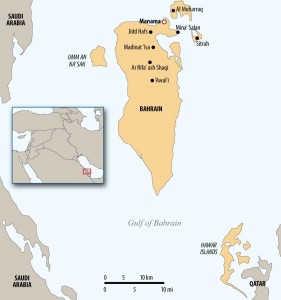Bahrain: Military Intervention Runs Risk Of Turning Into Armed Conflict
Bahrain’s crackdown and Saudi Arabia’s 14 March military intervention could turn a mass movement for democratic reform into an armed conflict while regionalising a genuinely internal political struggle.
Popular Protest in North Africa and the Middle East (III): The Bahrain Revolt , the latest report from the International Crisis Group, urges immediate third-party facilitation of a dialogue between the regime and the opposition with a view toward genuine political reform, defusing sectarian tensions and preventing further regionalisation of the unrest.
“Bahrain’s harsh crackdown and Saudi military intervention are fanning the flames Manama and Riyadh say they want to extinguish”, says Joost Hiltermann, Crisis Group’s Middle East and North Africa Deputy Program Director. “The most effective response to the perceived threat of a Shiite takeover and greater Iranian influence is not the violent suppression of peaceful street protests, but the equal treatment of all citizens and steps toward a constitutional monarchy and an inclusive parliament with real powers”.

Bahrain is a relatively open society, but the Al Khalifa monarchy has systematically worked to marginalise and disenfranchise the majority-Shiite population. Among other practices, it has recruited Sunni nationals of other states into the security forces and offered many of them a Bahraini passport.
Building on a long history of popular protest, young Bahrainis launched a largely non-violent protest in mid-February. In response, sensing it was losing control, the regime welcomed military intervention by members of the Gulf Cooperation Council (GCC) on 14 March. Saudi Arabia sent an estimated 1,000 troops as well as dozens of tanks and other equipment, while the United Arab Emirates dispatched some 500 police officers and Qatar sent its own troops. Following this show of force, King Hamad bin Isa Al Khalifa imposed a three-month “state of national safety”. Bahraini security forces attacked demonstrators throughout the Kingdom, killing some and injuring many more. Since then, the crackdown has intensified.
Given the level of distrust, credible third-party facilitation is both necessary and urgent. In this context, Manama should take immediate measures to prevent further escalation. The regime should release opposition activists, investigate police brutality against protesters, end sectarian rhetoric and practices and embrace national dialogue. And protesters should continue to use peaceful means to express their grievances and demands while agreeing to negotiate with the regime. The broader objective should be to end discriminatory practices against the Shiite community and to foster a more inclusive political system.
“Bahrain’s post-colonial history lends at least some hope to the possibility of dialogue and compromise as, despite its obvious problems, the country has also known a degree of pluralism and a vibrant civil society. But the window of opportunity is fast closing”, says Robert Malley, Crisis Group’s Middle East and North Africa Program Director. “There are no easy or cost-free paths, but the course of repression and sectarian polarisation would be the costliest of all. It is time that Manama and its GCC partners realise this – and their international allies help them reach that realisation”.
